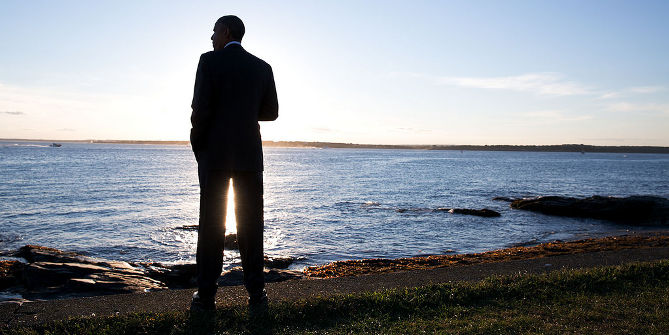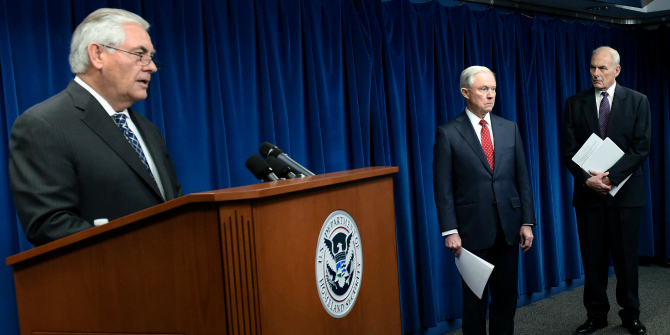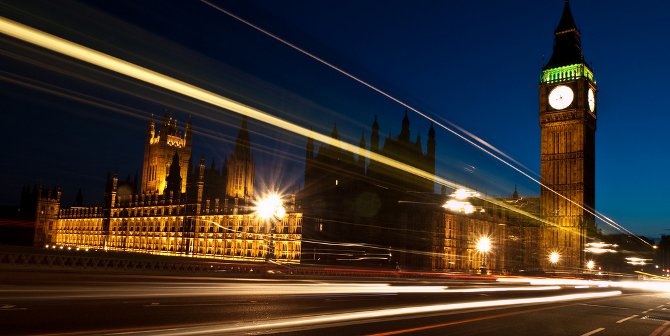 This year has seen President Obama move from foreign policy difficulties such as the Ebola crisis and Islamic extremism in Iraq to a string of triumphs including a commitment to normalize relations with Cuba and a climate deal with China. Reviewing US foreign policy in 2014, Peter Trubowitz reminds us that Obama came into office committed to rebalancing America’s international and domestic accounts and that there is no sign that this commitment has changed. Obama’s political challenge now is to build on these strategic gains over the final two years of his presidency.
This year has seen President Obama move from foreign policy difficulties such as the Ebola crisis and Islamic extremism in Iraq to a string of triumphs including a commitment to normalize relations with Cuba and a climate deal with China. Reviewing US foreign policy in 2014, Peter Trubowitz reminds us that Obama came into office committed to rebalancing America’s international and domestic accounts and that there is no sign that this commitment has changed. Obama’s political challenge now is to build on these strategic gains over the final two years of his presidency.
Last summer the wheels were coming off Obama’s foreign policy – or so it seemed to many observers. The reemergence of Islamic extremism in Iraq, the grisly beheadings of American hostages, and the Ebola crisis caught the administration flat-footed. Coming on the heels of Vladimir Putin’s annexation of the Crimea, the administration found itself on the defensive. Foreign policy, an Obama strong suit, suddenly was a drag on his approval ratings.
No longer. The surprise announcement that Washington is normalizing relations with Havana after a half-century of containment and isolation has met with broad popular approval. So has the deal Obama struck with Beijing in November on climate change, and the recent decision to grant amnesty to some 5 million illegal immigrants, mostly from neighboring Mexico. A new CNN/ORC poll finds that Obama’s approval rankings have jumped to a 20 month high at 48 percent.
What explains Obama’s foreign policy surge? Ironically, part of the answer is the drubbing he and fellow Democrats took in the November midterm elections. With Republicans taking control of both the House and Senate, Obama had a strong incentive to counter the “lame duck” narrative starting to take shape in the media. Because Republicans are more united on domestic policy, it made sense for the White House to focus its efforts on the foreign policy front.
These foreign policy issues were also ripe for the plucking. Isolating Cuba made little sense for Washington. It made even less for Havana, especially at a time when its main benefactor, Venezuela, is on the economic ropes. Meanwhile, the Chinese leader Xi Xinping seems to have concluded that Beijing’s heavy-handed foreign policy the past few years was not winning it many friends in Asia or beyond. By meeting Obama halfway over climate change, he has signaled that China also knows how to act responsibly on the international front.
Some might view Obama’s recent actions as a strategic correction – as a tacit acknowledgment that his earlier approach to foreign policy failed. Yet Obama’s recent actions are pretty consistent with the broad principles that have guided his foreign policy since taking office in 2009: put greater stock in quiet diplomacy, be willing to negotiate with your adversaries, avoid getting sucked into conflicts of little intrinsic value to the United States (a.k.a. “Don’t do stupid stuff”).

Even the unilateral nature of Obama’s recent actions does not represent a departure from historical precedent. When campaigning for the presidency in 2008, Obama criticized George W. Bush’s use of executive action. However, as presidential scholars Sidney Milkis and Kenneth Lowande point out, Obama’s record on this front is not fundamentally different from Bush’s. Faced with the challenge of governing in an era of extreme partisanship, Obama has done the expedient thing: act unilaterally.
While Obama may have his foreign policy mojo back again, his overall strategy remains the same. And it is unlikely to change. The White House will continue to search for ways to cut America’s losses in the Middle East and invest more time and energy in regions of greater long-term importance to the United States, most notably Asia. Moreover, Obama will continue trying to do this on the cheap: by substitutingdiplomacy for military power where possible.
As I have argued elsewhere, the reasons for this are as much political as they are strategic. Obama came into office committed to rebalancing America’s international and domestic accounts and as we close out 2014, there is no sign that Obama’s political calculus has changed. America may not be as overstretched as it was when Obama took office in 2009, but the US was too heavily invested in international real estate (e.g., Central Asia) that made little sense geopolitically or domestically for a president who was elected to do big things on the domestic side of the ledger.
The success of Obama’s foreign policies today is partly a function of timing and other things the White House cannot completely control. Just as high oil prices made it easier for Putin to discount Obama’s economic sanctions over the Crimea, the fall of oil prices has given those same sanctions additional bite. Venezuela’s economic weakness helped bring Cuba around. By the same logic we should not be surprised to learn that Iran has suddenly become more willing to scale back its nuclear capabilities in return for the lifting of Western economic sanctions.
Where Obama deserves credit is in taking the long view. Vladimir Putin is still in the Crimea, but Obama’s unwillingness to get dragged in is looking smarter by the day. In the smoldering conflicts in Iraq and neighboring Syria, the administration still seems clearer on what it is trying to avoid than on what it is trying to achieve. But here too Obama wisely ignored neoconservative hardliners who were urging deeper American military involvement to no apparent strategic end.
For Obama, the political challenge is to build on the strategic gains he has posted since November. For reasons mentioned, the nuclear talks with Tehran would seem to be the most propitious. Given the favor Obama has curried with his Democratic base over climate change and immigration, we might also see him make a strong push for fast track trade authority. As Obama, referring to the next two years, recently put it: “My presidency is entering its fourth quarter. Interesting stuff happens in the fourth quarter.”
Please read our comments policy before commenting.
Note: This article gives the views of the author, and not the position of USApp– American Politics and Policy, nor of the London School of Economics.
Shortened URL for this post: http://bit.ly/1tshLtT
_________________________________________
 Peter Trubowitz – LSE International Relations
Peter Trubowitz – LSE International Relations
Peter Trubowitz is Professor of International Relations at the LSE. His main research interests are in the fields of international security and comparative foreign policy, with special focus on American grand strategy and foreign policy. He also writes and comments frequently on U.S. party politics and elections and how they shape and are shaped by America’s changing place in the world.






